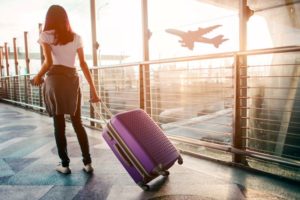 It is a sad reality that the need for a tooth extraction could arise at any time. Unfortunately, the procedure can temporarily throw off your routine and interfere with your plans. It might be particularly stressful if you have travel arrangements for the near future. Is it safe to fly after a tooth extraction? Read this blog post to discover what you should know before you board your next flight.
It is a sad reality that the need for a tooth extraction could arise at any time. Unfortunately, the procedure can temporarily throw off your routine and interfere with your plans. It might be particularly stressful if you have travel arrangements for the near future. Is it safe to fly after a tooth extraction? Read this blog post to discover what you should know before you board your next flight.
You Should Rest for 48 Hours
After you get a tooth extracted, it is important that you care well for your mouth in order to prevent a complication known as dry socket. This painful condition occurs when the blood clot at an extraction site gets dislodged or fails to form.
Unfortunately, flying heightens the risk of dry socket. Additionally, the physical activity involved with traveling — for example, you might have a long walk through the airport — can slow down your body’s ability to heal.
In the interests of your safety, most dentists recommend that patients do not fly during the initial 48 hours after a tooth extraction. In fact, it would be ideal if you waited at least one week.
Flying During Your Recovery Period
If you have no choice but to fly while you are recovering, it should be somewhat safe for you to do so after the initial 48 hours. However, you should be prepared for some discomfort. Changes in altitude and air pressure could irritate your sinuses. In turn, that could cause your mouth to hurt. It may be particularly painful if you had one of your upper teeth removed.
Other symptoms that some people experience when they fly, such as headaches or general dental pain, may also feel worse when you are still recovering from a tooth extraction.
Tips for Safe and Comfortable Flying
If you have to fly while you are still on the mend, use these tips to make your travel experience a bit easier:
- Pack pain medication. You can use whatever over-the-counter medication that you would normally use for a headache. Ibuprofen and acetaminophen both work well.
- Bring gauze. You might experience some mild bleeding during your flight. Gauze can help you manage it.
- Bring a resealable plastic bag. Ask the flight attendant for some ice, and you should be able to make a cold pack to keep swelling down.
- Bring soft snacks. It is best to eat soft foods after an extraction. It might be tricky to find suitable choices in the airport or on the plane, so be sure to pack something that can stave off any hunger. Applesauce, yogurt, and protein shakes are good choices.
- Be ready to call your dentist. If you run into any problems with your extraction site while you are at the airport, call your dentist. They can give you advice on what to do.
Flying soon after a tooth extraction is not comfortable, but it is usually safe after the first part of the recovery period. Use the above tips to make your experience as easy as possible.
Meet the Practice
Comprehensive Dental Associates of Central Connecticut provides general and emergency dental services in a welcoming environment. If you need a tooth extraction or have questions about what to expect following the procedure, we are ready to speak with you. Get in touch with us at 860-288-5786.
